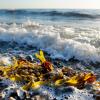Sustainable expansion of the aquaculture industry has to take place with use of third generation feed ingredients. Examples of such ingredients include microalgae, single cell organisms and insect meal. The NON-Fôr project aims to build upon the state-of-the-art knowledge from previous EU and National projects and develop improved practices in feed manufacturing technology to promote the use of third generation ingredients in critical life stages of Atlantic salmon - startfeeding, during smoltification and in post smolt production.
The project aims to study :
1) the quality of protein in the insect meal and microbial ingredients, 2) the quality of pellets produced by incorporating the third generation ingredients to provide suggestions for quality improvement that can be adopted in the commercial production of these feeds, 3) the potential of insect meals as replacers of fish meal and oil, and algae oil as replacer of fish oil at start feeding and during smoltification, 4) the environmental impact of the new feeds.
The project will endeavour to generate significant new knowledge, strengthen research capacity, equip both master and PhD students with skill sets for aquafeed technology, and build long-term international research networks between the participating countries. The multi-disciplinary project consortium brings together partners with established expertise in the respective fields of feed ingredient quality, protein quality, feed manufacturing technology, fish nutrition, fish health and assessment of environmenal and societal impact of new products.
The project will also offer an opportunity for start up companies to demonstrate the quality of their products as well as testing of commercially available sustainable alternatives to fish oil. The consortium’s Multi-Actor Approach is oriented to the needs and demands of the aquaculture industry, improving knowledge exchange, innovation, communication and dissemination and thus increasing the final impact of the project. NON-Fôr aligns well with the science policy framework of Responsible Research and Innovation.
